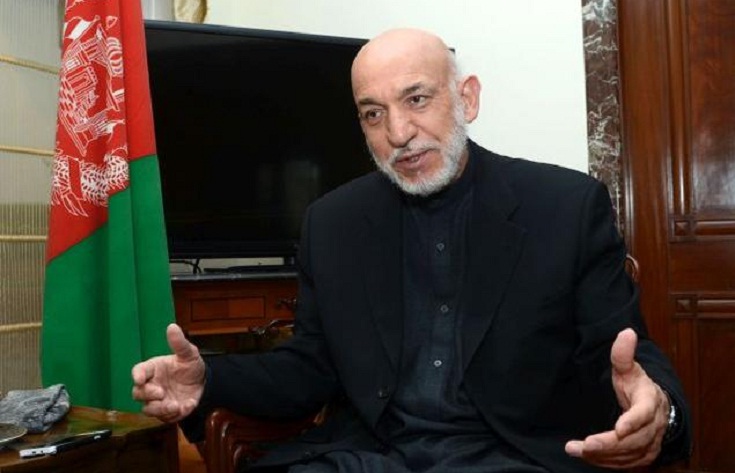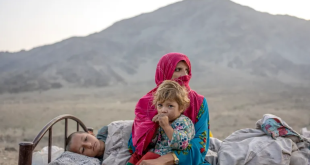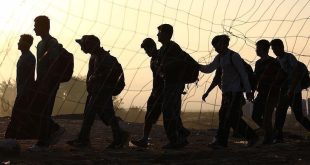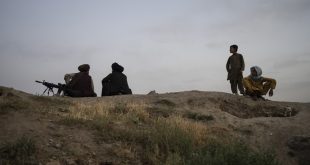KABUL — Hamid Karzai, the former Afghan president, was in high dudgeon Friday morning. His children were playing hide-and-seek on the lawn outside his book-lined study, and a waiter had brought in trays of tea and cakes, but his mind was on a deadly NATO airstrike that killed 30 civilians in northern Kunduz province early Thursday.
“I spoke to the families yesterday. I saw the photos of the victims. There were children from 6 months to toddlers, near-teens and elders. Why?” Karzai demanded angrily. A few moments later, he turned to an aide and asked, “Was there any mention of this mass tragedy on CNN, on BBC? I didn’t see anything.” Karzai, 58, has railed for years against U.S. military bombings and resulting civilian casualties in the war against Taliban insurgents, and the issue virtually destroyed his relationship with the Obama administration. It was the main reason he refused to sign a bilateral security agreement with Washington before leaving office in 2014, and it remains his personal obsession in political retirement.
The exact events in Kunduz were still unclear Friday, but Afghan officials confirmed an updated death toll of 30 civilians and at least 25 wounded in airstrikes launched outside the embattled provincial capital after a firefight with Taliban forces. Two U.S. service members were killed in the battle, along with three Afghan commandos and three Taliban fighters. U.S. military officials have said the strikes were conducted by NATO aircraft but have not said whether the pilots were American or Afghan. The civilian deaths sparked protests by victims’ relatives in Kunduz and denunciations by some rights groups, including Amnesty International. A recent U.N. report found that casualties attributed to pro-government forces here have jumped by 42 percent in the past year.
Most NATO combat troops left Afghanistan in 2014, and Afghan forces have been battling the Taliban with help from a few thousand Western troops and advisers. Just over a year ago, during a battle with Taliban forces in Kunduz, an errant U.S. airstrike killed 42 people at a hospital, sparking accusations of a war crime and leading to disciplinary action against 16 U.S. military personnel.
As Karzai saw it, the fatal bombings Thursday were further proof of his long-standing contention that the U.S. military role in Afghanistan has been misguided, needlessly deadly and possibly motivated by a cynical agenda that he believes has subordinated Afghan lives and sovereignty to strategic international goals.
He was especially critical of the ongoing security relationship between the United States and Pakistan, which he denounced as “the source” of insurgent attacks. During his presidency, Karzai met often with Pakistani leaders to improve ties but became deeply disillusioned. He said those who sought peace with Afghanistan were stymied by other forces. “They want to own us,” he said. In a 90-minute interview Friday punctuated by anecdotes and musings from his decade as president, Karzai repeatedly returned to this darker theme. He declined to discuss or criticize the government of President Ashraf Ghani, but he bitterly denounced the U.S. government as pursuing war over peace in his country.
“I am not an anti-Western person, but what has made me outspoken and angry at America are the casualties,” he said. “Just show me one example of a bombing that has taken Afghanistan one step closer to peace. Fifteen years on, do we have more Taliban or less, more radicalization or less, more terror or less? Is this really a war against terror, or is it something else in which the lives of Afghans don’t matter?”
U.S. military officials here have repeatedly said that they seek to avoid civilian casualties but that Taliban fighters sometimes use civilians and their homes as shields and such casualties are inevitable in a war against insurgents. The war has left more than 2,400 U.S. service members dead, as well as more than 90,000 Afghan defense-force members and civilians.
The Ghani administration has taken pains to repair relations with Washington over the past two years. Ghani enthusiastically signed the bilateral security agreement that Karzai snubbed and that has given U.S. military forces wide latitude in their official role to advise and assist Afghan security forces. U.S. warplanes can back up Afghan forces in danger, and Afghan pilots operate American-supplied combat aircraft.
On Friday, Ghani said he was “deeply saddened” by the civilian casualties in Kunduz.
Karzai has been criticized as trying to interfere in Afghan politics, possibly with an eye toward returning to power. In the interview, he insisted that he had no wish to return to office and said that under the constitution, Ghani should have full authority to govern for a full five-year term.
However, the former president blamed a U.S.-brokered power-sharing agreement between Ghani and his electoral rival, Abdullah Abdullah, for “creating confusion” about whether Afghanistan should have a presidential or parliamentary system. He has strongly suggested that a national gathering of elders be held to decide that issue. (Washington Post)
 Afghanistan Times
Afghanistan Times




